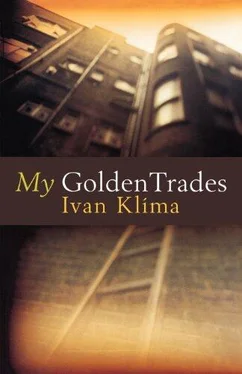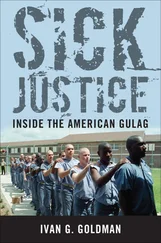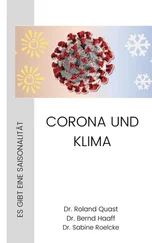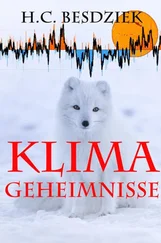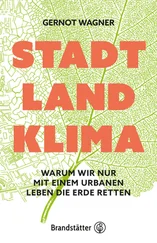Ivan Klima - My Golden Trades
Здесь есть возможность читать онлайн «Ivan Klima - My Golden Trades» весь текст электронной книги совершенно бесплатно (целиком полную версию без сокращений). В некоторых случаях можно слушать аудио, скачать через торрент в формате fb2 и присутствует краткое содержание. Год выпуска: 1998, Издательство: Granta UK, Жанр: Современная проза, на английском языке. Описание произведения, (предисловие) а так же отзывы посетителей доступны на портале библиотеки ЛибКат.
- Название:My Golden Trades
- Автор:
- Издательство:Granta UK
- Жанр:
- Год:1998
- ISBN:нет данных
- Рейтинг книги:4 / 5. Голосов: 1
-
Избранное:Добавить в избранное
- Отзывы:
-
Ваша оценка:
- 80
- 1
- 2
- 3
- 4
- 5
My Golden Trades: краткое содержание, описание и аннотация
Предлагаем к чтению аннотацию, описание, краткое содержание или предисловие (зависит от того, что написал сам автор книги «My Golden Trades»). Если вы не нашли необходимую информацию о книге — напишите в комментариях, мы постараемся отыскать её.
My Golden Trades — читать онлайн бесплатно полную книгу (весь текст) целиком
Ниже представлен текст книги, разбитый по страницам. Система сохранения места последней прочитанной страницы, позволяет с удобством читать онлайн бесплатно книгу «My Golden Trades», без необходимости каждый раз заново искать на чём Вы остановились. Поставьте закладку, и сможете в любой момент перейти на страницу, на которой закончили чтение.
Интервал:
Закладка:
Kafka had certainly never tried to be a surveyor; and his novel, of course, was neither about surveying nor about a castle. It was a story about his own vain longing to go behind closed doors. We all have different doors through which we may not pass. The greatness of an artist consists in constructing his door so that in it, we can also see the door that blocks our own way.
An old man with a large, angular head was approaching me along the hallway. A pair of prominent ears poked out from under his curly grey hair. He stopped. I could feel him measuring me with his eyes. 'Looking for someone, comrade?'
The word 'comrade' grated on me and I replied, reluctantly, that I wasn't. Then, afraid that I had been too brusque with the old man, I added, 'I'm here to arrange something.'
'Ah,' he said. 'If you want to get your parents in here,
you haven't got a chance.'
'No, that's not what I'm here for.'
'Unless you can fork out over ten thousand — like that.' He struck his thigh with a big, ruddy fist. 'Everyone here goes around with their hand out. If you don't shell out, they won't even sweep under your bed. And you'll get a piece of rotten meat for lunch. Complain and you'll never see a decent piece of meat again. That's what we've come to.'
Fortunately, the surveyor arrived and took me into a store-room where a congenial-looking housekeeper gave us a metal hospital bed and a mattress.
When we returned with it to the square, the surveyor remarked that our faded Napoleonic palace was soon to be demolished. That was why we were getting it rent free, he said. There was a flush toilet on the balcony, and although they'd cut the water off, it didn't matter because I had running water in my room. They'd disconnected the electricity as well, but fortunately Mr Wolf, who moved out last week, still kept a garage in the courtyard, which meant he had his own meter. For a fee, said the surveyor, he's allowed us to tap into his circuit. The stationer's store was all that was left, and Mrs Pokorná, the former owner, who lived in a flat on the ground floor.
When I'd swept the worst of the mess off the floor and brought my things in from the car, the surveyor looked at his watch as if to say it was time to go. But before we set off to work he pulled a well-thumbed book out from his desk and asked me if I'd like to read the safety regulations. I replied that I didn't think it would be necessary, and he agreed that they were mostly hot air. He did recommend, however, that I always wear the gloves he would issue me
with now. He handed me a pair of yellow work gloves made of rough pig-skin, and I signed a paper saying I'd been informed about safety on the job.
In the courtyard there were several sheds in varying states of collapse. One had a waterproof roof and a door with a lock. This housed the instruments and items worth stealing: tripods, an axe, a machete, a hoe, shovels, a pickaxe, paintbrushes, stakes, paint, solvents and a sack of coal. A shed that leaked contained poles and stone plates, while cement markers were piled untidily in a shed missing its entire front wall. Between the sheds and the entrance to the courtyard was a pile of rubbish so old that it no longer smelled.
We loaded the tools and equipment we needed into the car — I rather carefully, anxious not to spill or break or misplace anything. We took three colours of paint with us: red, white and black. Had we felt like painting national flags on walls, we couldn't have done much — the colours of Bohemia, the Polish, the Danish, the Swiss and the Canadian flags — these were the only ones I could think of. The paintbrushes, Kos told me, should always be kept in plastic bags, securely tied so they wouldn't dry out. Japan and Laos also had red and white flags, I remembered. But we wouldn't have been able to do Laos unless we could paint elephants.
It was already eleven-thirty. Expecting the worst, I got in beside the surveyor and we drove off. My new boss asked me if I could understand maps.
I did understand maps; in fact, I used to collect them.
He handed me a brand new ordnance survey map, stamped with a warning that it was a secret document. The trigonometric points were marked with orange circles.
We had five maps, with a total of almost two hundred points, each of which we were to locate and re-survey; if necessary, we would also have to relocate or replace the stone or set in a new one and paint the stake. Our first point that morning was number twenty-three outside the hamlet of Tribucha. It wouldn't be easy to find, Kos said. He'd already driven out that way, and the stake was missing and the stone had vanished under the alluvium. Then, having said all there was to say, he fell silent and concentrated on driving.
Although it was early September, the sun was still hot. I studied the countryside, constantly referring back to the map, bringing us nearer to the invisible point number twenty-three.
Evening
WHEN WE RETURNED to our residence that evening, I rinsed myself off and changed my clothes, then connected my lamp to the cable we used to bring in the borrowed current. I had planned to wash at least one of the windows, but I was too tired.
That afternoon we had dug six holes into which we set concrete markers; we had painted nine stakes and cut a twenty-metre sight-line through the vegetation with our machetes. I had helped with the actual surveying, which, compared with the digging, had seemed like a rest. I wasn't used to the pick and, after digging the third hole, I didn't think I could go on. Yet I did, and my young boss took turns with me, doing his share and, as the day progressed, taking on more and and more without making it look as though he were doing me a favour. Now he retired to his room and I saw him sit down at his wretched little table, take out his calculator and start working up the figures we'd gathered that afternoon.
I wasn't surprised to find him working at night. I was used to it from my childhood. Engineering is a monastic discipline to which you must sacrifice everything. To its disciples the only time well spent is time spent working.
Early in life I recognized that while fantasists, prophets and politicians struggle among themselves about how better to organize and articulate the world, it is scientists and engineers who silently and tirelessly put their notions of the world and life into practice. They measure everything they can touch. They calculate the bearing capacity of bridges and causeways; they wrap the world in a network of pathways on water, on land and in the air. They raise buildings higher than the pyramids; they drive tunnels under the Alps. They build factories and hospitals, and are constantly inventing new machines and instruments to use inside them. They draw up plans for rapid-firing weapons, body scanners, explosives, gas-chambers — and assembly-lines to produce them. They invent thousands of new drugs, chemical weapons, herbicides and fungicides. They build rockets, feeder farms, enormous generators and nuclear reactors. And when the world is slowly suffocating under the waste products of these labours, where do we turn for help? To the scientists, of course. They will decide which of the waste products can be easily and cheaply disposed of. They will invent antidotes to the toxins. And antidotes to the antidotes.
The idea of a countable, measurable and precisely expressible world is a seductive one. It has seduced even those who, by the very nature of their activity, ought to resist it. Not only have painters, poets, composers, literary critics and philosophers fallen in love with the dazzle of electric lights and fast cars, they have begun, in their work and research, to adapt to the scientist's world. They paint geometric images, compose concrete music and poetry, transform verse into diagrams and the mystery of Being into mathematical formulae.
Читать дальшеИнтервал:
Закладка:
Похожие книги на «My Golden Trades»
Представляем Вашему вниманию похожие книги на «My Golden Trades» списком для выбора. Мы отобрали схожую по названию и смыслу литературу в надежде предоставить читателям больше вариантов отыскать новые, интересные, ещё непрочитанные произведения.
Обсуждение, отзывы о книге «My Golden Trades» и просто собственные мнения читателей. Оставьте ваши комментарии, напишите, что Вы думаете о произведении, его смысле или главных героях. Укажите что конкретно понравилось, а что нет, и почему Вы так считаете.
